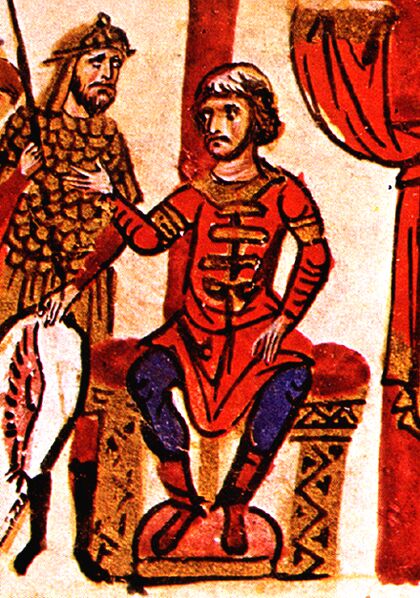|
Bulgar–Serb War (839–842)
The Bulgarian-Serbian War of 839–842 was fought between the First Bulgarian Empire and the Serbian Principality. It was the first conflict of the medieval Bulgarian–Serbian Wars. Prelude According to ''De Administrando Imperio'', the Serbs and Bulgars had lived peacefully as neighbours until the Bulgarian invasion in 839 (in the last years of emperor Theophilos). It is not known what exactly prompted the war, as Porphyrogenitus gives no clear answer; whether it was a result of Serbian–Bulgarian relations, i.e. the Bulgarian conquest to the southeast, or a result of the Byzantine-Bulgarian rivalry, in which Serbia was at the side of the Byzantines as an Imperial ally. It was not unlikely that the Emperor had a part in it; as he was in war with the Arabs, he may have pushed the Serbs to drive the Bulgars from western Macedonia, which would benefit them both. According to J. B. Bury, this alliance would explain the cause of the Bulgarian action. Vasil Zlatarski supposes that ... [...More Info...] [...Related Items...] OR: [Wikipedia] [Google] [Baidu] |
Bulgarian Empire
In the medieval history of Europe, Bulgaria's status as the Bulgarian Empire ( bg, Българско царство, ''Balgarsko tsarstvo'' ) occurred in two distinct periods: between the seventh and the eleventh centuries and again between the twelfth and the fourteenth centuries. The two "Bulgarian Empires" are treated not as separate entities but rather as one state that was restored after a period of Byzantine rule over its territory. First Bulgarian Empire Moesia was repeatedly invaded by both Slavs and Bulgars during the 5th, 6th and 7th centuries. In 499, the Bulgars crossed Danube and reached Thrace where on the banks of the river Tzurta (considered a tributary of Maritsa) defeated 15,000 men strong Roman army led by magister militum Aristus. In the 670s under the rule of Asparukh the Bulgars settled further south on territories of the Eastern Roman Empire in Scythia Minor near the Danube Delta in a region called Ongal and allied with the local Slavs. Their ho ... [...More Info...] [...Related Items...] OR: [Wikipedia] [Google] [Baidu] |
840s Conflicts
84 may refer to: * 84 (number) * one of the years 84 BC, AD 84, 1984, AD 2084 * Eighty Four, Pennsylvania, an unincorporated census-designated place in Washington County, Pennsylvania, United States * Seksendört Seksendört (also known as Grup 84) is a Turkish pop rock band from Ankara. Seksendört consists of Tuna Velibaşoğlu, Arif Erdem Ocak, Serter Karadeniz, and Okan Özen. The band was formed in 1999 and started getting noticed under the name 'Sek ..., a Turkish pop group whose name means 84 See also * * List of highways numbered {{Numberdis ... [...More Info...] [...Related Items...] OR: [Wikipedia] [Google] [Baidu] |
830s Conflicts
{{Numberdis ...
83 may refer to: * 83 (number) * ''83'' (film), a 2021 Indian cricket film * one of the years 83 BC, AD 83, 1983, 2083 * "83", a song by John Mayer on his 2001 album ''Room for Squares'' See also * * List of highways numbered A ''list'' is any set of items in a row. List or lists may also refer to: People * List (surname) Organizations * List College, an undergraduate division of the Jewish Theological Seminary of America * SC Germania List, German rugby union ... [...More Info...] [...Related Items...] OR: [Wikipedia] [Google] [Baidu] |
Wars Involving Medieval Serbian States
War is an intense armed conflict between states, governments, societies, or paramilitary groups such as mercenaries, insurgents, and militias. It is generally characterized by extreme violence, destruction, and mortality, using regular or irregular military forces. Warfare refers to the common activities and characteristics of types of war, or of wars in general. Total war is warfare that is not restricted to purely legitimate military targets, and can result in massive civilian or other non-combatant suffering and casualties. While some war studies scholars consider war a universal and ancestral aspect of human nature, others argue it is a result of specific socio-cultural, economic or ecological circumstances. Etymology The English word ''war'' derives from the 11th-century Old English words ''wyrre'' and ''werre'', from Old French ''werre'' (also ''guerre'' as in modern French), in turn from the Frankish *''werra'', ultimately deriving from the Proto-Germanic *''we ... [...More Info...] [...Related Items...] OR: [Wikipedia] [Google] [Baidu] |


